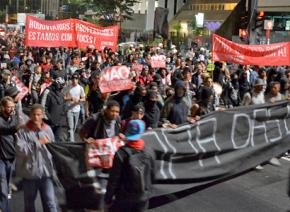Striking on the eve of the Cup
Billions of dollars has been spent in preparation for the 2014 World Cup in Brazil--the most expensive in history. Meanwhile, the poor and working people of the host country have seen no improvements in their daily lives--quite the contrary. , writing on behalf of the Brazilian labor federation Central Sindical e Popular-Conlutas, calls for international solidarity with the massive surge of strikes and protests that has brought tens of thousands into the streets in the run-up to the World Cup.
IT IS time for strikes. After the huge mobilizations last June, primarily youth ones, now it is the working class that is shaking Brazilian cities.
In São Paulo on May 15, the city came to a halt. In the early morning striking metalworkers, together with the homeless workers' movements (MTST and Ocupação Esperança), blocked avenues in the outlying areas. Downtown, metro workers demonstrated in the morning, and teachers demonstrated in the afternoon. Strikes and demonstrationss were the main headlines on all the news.
The mobilizations were not limited to May 15. Teachers have been holding demonstrations of thousands every week during the last 40 days. Bus drivers went on strike for two days against both the mayor, the bus companies and their union, eventually bringing São Paulo to a halt.
In Cubatão, a highly industrialized area on the São Paulo state shore, thousands of outsourced workers are on strike, stopping sectors of the local Petrobras refinery. In São Jose dos Campos, metalworkers are holding stoppages. University employees, professors and students of the University of São Paulo, together with their counterparts in the University of Campinas and São Paulo State University, are on strike demanding more funding. On top of that, metro workers are scheduled to go on strike on Thursday, June 5.

In other capitals across Brazil, the situation is not different. In Rio de Janeiro, teachers' demonstrations and bus drivers' stoppages together are showing the workers' mood and strength. In other capitals, key sectors of the working class are on the offensive. Different sectors of federal public workers are going on strike. Even the police, both military and civil, are holding protests across the country.
The economic slowdown and high indebtedness are changing the mood among working families. There is a general feeling that things are not getting better. On top of that, the Brazilian government has expended huge sums for the World Cup--this is gathering general disapproval for the lack of funding for public education, health care and transportation. The surveys show that 55 percent of the Brazilian population believes that the World Cup will be more of a burden than a benefit for working people.
Besides the current struggles--teachers, university employees, metalworkers, public workers, police and the homeless movements--the metro workers of São Paulo might take action on June 5, and there will be a national day of mobilizations on June 12 when the World Cup starts.
We ask labor and youth movements across the world to express solidarity with Brazilian workers. Marches and demos will be warmly welcomed. Advancing the workers' struggles in Brazil will be an advance for the working class worldwide.
Long live the workers' struggles in Brazil! Long live international solidarity among the working class!


